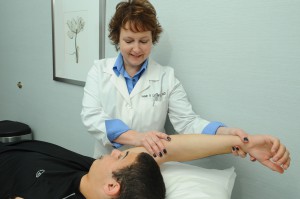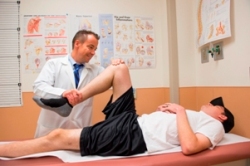Spinal cord injuries are among the most serious and life-altering injuries a person can sustain. The spinal cord, a complex bundle of nerves, is the primary pathway for communication between the brain and the rest of the body. When it’s damaged, a patient could be...
People who suffer from varicose veins, chronic venous insufficiency (CVI), and other related health conditions know that their symptoms involve more than just cosmetic concerns. They also frequently cause pain, swelling, and more serious health problems. For these...
Our smartphones, tablets, and laptops have connected us to the world in ways that we could never have imagined. We carry our offices, our social lives, and our entertainment with us everywhere we go. But this constant connectivity often comes with a trade-off, one...
5 Common Myths About Growing Pains

You’ve probably heard someone tell a child something along the lines of it’s just growing pains. Many people believe that throbbing pain in the legs or arms of an underdeveloped child can be attributed to the child growing. However, there’s no evidence that growth can be painful. As a child gets older, they’ll experience some pain due to other problems. Learn more about common myths people believe in regarding growing pains.
- Growing pain
s are real. While it’s possible that a child is experiencing pain, it’s not because he or she is growing. Growth doesn’t correspond with pain, with the exception of teething. If your child is complaining about pain, you should take them to a doctor for a physical because they’re dealing with an issue that probably has nothing to do with growing. - My child will eventually stop having growing pains. Some parents think their child will just grow out of their pain and it will stop. Since there isn’t scientific evidence that supports growing pains, a child complaining about pain is suffering from an actual problem. Ignoring the problem, whether it’s an injury or a disease, won’t make the issue go away. The child has to be evaluated by adoctor and given the appropriate treatment.
- My child plays sports, so it’s normal for him or her to experience pain.
It’s never normal for anyone to experience pain if there isn’t a more serious issue. In fact, it’s especially important that you address your child’s aches and pains if he or she is physically active or involved in sports because that means there’s a greater chance that your child is dealing with an injury.
It’s common for children to be injured while playing sports because they aren’t experts in the game and they often use improper techniques. The lack of knowledge regarding proper technique leads to young players injuring themselves and others. They’re also still growing and their bodies aren’t very strong, so broken bones and sprains can happen.
Pay close attention to your child athlete because injuries left untreated can lead to serious problems in the future.
- My child only complains every now and then. If your child complains sporadically, he or she could still be dealing with a serious injury. They may stop complaining if they have a high pain threshold and become used to the feeling or if the injury only hurts when being moved in a specific position. The bottom line is that if your child complains of pain at any point, you should have him or her examined by a physician.
Growing pains haven’t been proven, so if your child tells you that they’re suffering, don’t ignore them. Take them seriously and have them checked out by a doctor. Injuries that go untreated can cause diseases and limb problems down the line. Click here to set up a consultation with one of the qualified physicians at Premier Orthopaedics.
For more information about fracture care, click here to download our free eBook,Understanding Fracture Care: Causes, Diagnosis, and Treatment.



